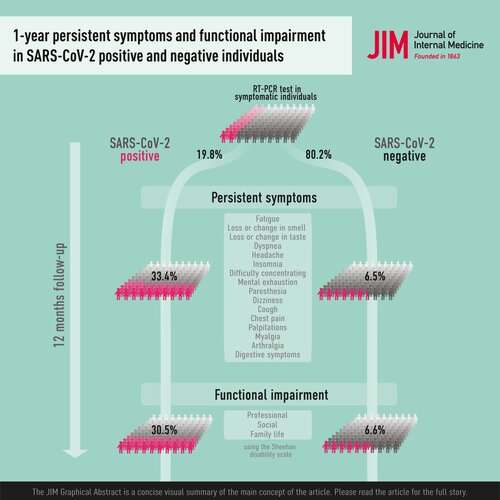
Post-COVID illness is characterized by persistent symptoms of COVID-19 at least three months after an infection by SARS-CoV-2. Faced with the great diversity of symptoms and the emerging knowledge on the subject matter, the scientific and medical communities wish to better understand the evolution and the exact causes of this condition. Are they mainly due to the infection itself or to indirect effects induced by the pandemic situation, in particular the sanitary measures and the resulting social and economic situations?
By comparing, one year later, people who tested positive for SARS-CoV-2 with those who tested negative, researchers from HUG and UNIGE report that 33.4% of infected people had mild to moderate residual symptoms, compared to 6.5% in the control group. “Our results confirm that the main cause of post-COVID condition is the infection by the virus, but that we must also consider the indirect effects generated by the pandemic situation,” says the first author of the study, Dr. Mayssam Nehme, senior resident at the Division of Primary Care Medicine at the HUG.
Functional capacity impacted
Symptomatic people tested for SARS-CoV-2 from April to July 2021 at HUG were followed for one year after their infection with the Alpha variant. 1,447 people were included in the study, 20% of whom had a positive PCR test and 80% a negative PCR test.
The main symptoms reported by participants included fatigue, dyspnea (difficulty breathing), headaches, insomnia and difficulty concentrating. People infected with SARS-CoV-2 reported that these symptoms impacted their functional capacity in 30.5% of cases, compared to 6.6% for the control group. Notably, productivity or the ability to work is up to three times lower in infected people. Mayssam Nehme is worried: “This loss in functional capacity affects the social, professional and personal aspects of life. It could therefore have an important cost on the society overall.” Especially since everyone can develop persistent symptoms: men and women, people under 60 and people without a medical or psychiatric history.
Decline in quality of life
The quality of life and mental well-being were found to be poor in both groups, suggesting an overall impact of the pandemic on the quality of life, independently of the infection. Levels of anxiety and depression are even higher in the uninfected group than in the infected group.
Reduce the risk
Persistent symptoms affect the functional capacity for up to 12 months after the infection. “These results confirm that this long-term condition is complex, that it can impact everyday life, and that we are certainly only seeing part of it. It is therefore necessary to set up appropriate care, i.e. a multidisciplinary consultation and management plan given the great diversity of symptoms,” indicates Idris Guessous, physician Head of the Division of Primary Care Medicine at HUG and associate professor at the UNIGE.
As SARS-CoV-2 continues to evolve and spread, physicians and professionals should continue monitoring patients and encouraging them to avoid an infection or re-infection, regardless of their age, gender and health status, to reduce the risk of developing a post-COVID condition.
Do you suffer from post-COVID condition?
The authors of the study also created the RAFAEL platform in November 2021 (in French). It allows citizens and users to determine whether or not they have persistent post-COVID symptoms and to orient them within the healthcare network. Rafael is for all age groups.
RAFAEL organizes monthly webinars until June, allowing Internet users to exchange with HUG doctors and other specialists in relation to this issue. The next one will be held on Wednesday, April 6.
Source: Read Full Article
